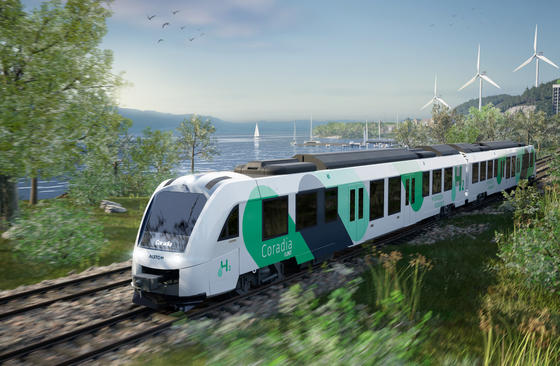
Alstom's Coradia iLint hydrogen train runs for the first time in Sweden
Alstom's Coradia iLint hydrogen train runs for the first time in Sweden

Press contact - Samuel Miller
Samuel Miller
Send an email- A huge opportunity for Sweden to reduce CO2 emissions and help decarbonise rail transport
- An innovative answer to sustainable mobility without compromise
25 August 2021 – Alstom's Coradia iLint passenger train, the first in the world to be powered by hydrogen, makes its Swedish debut in Östersund today. Alstom teams are presenting the train to a variety of local stakeholders, including regional operators, transport authorities, government decision makers and leading media, to highlight the potential of the Coradia iLint for sustainable transport in Sweden.
“The Coradia iLint trains represent a huge opportunity for Sweden to reduce CO2 emissions and even decarbonise rail transport. Thanks to hydrogen-powered public transport, regional operators can be beacons of modern mobility, as experienced recently in Germany, the Netherlands and Austria – that have tested and are implementing (or planning to implement) hydrogen trains.”
Sustainable Mobility Without Compromise
In 2016, the launch of the Coradia iLint, a CO2-emission-free regional train that represents a true alternative to diesel power, positioned Alstom as the first railway manufacturers in the world to develop a passenger train based on hydrogen technology. The first two 100% H2 iLint trains entered commercial service in 2018 in Germany and have already covered more than 200 000 km. To date, 41 trainsets have been ordered in Germany, and successful trials have taken place in Austria and in the Netherlands. In Italy, the operator FNM confirmed an order for 14 100% H2 trains at the end of 2020.
In line with its aim to facilitate a global transition to a low-carbon transport system, Alstom has pioneered several sustainable mobility solutions. The Coradia iLint is a perfect illustration of Alstom’s commitment to designing and delivering innovative and environmentally friendly solutions: the Coradia iLint is the world’s first passenger train powered by a hydrogen fuel cell, which produces electrical power for traction. This zero-emission train emits low levels of noise, with exhaust being only steam and condensed water. Its performance matches with regular regional trains with a maximum speed of 140 km/h and comparable acceleration and braking performance. Likewise, passenger capacity is up to 300 passengers and the train has a range of 1,000 kilometres.
The innovative hydrogen technologies implemented by Alstom have been recognised by the industry. In 2021, world's first hydrogen train Coradia iLint was honoured with the European Railway Award 2021. Alstom are also doing this to demonstrate that hydrogen is a possible climate friendly solution for trains in general, not just the iLint.

Hydrogen Trains for Non-Electrified Routes
Designed specifically for use on non-electrified lines, the Coradia iLint enables clean, sustainable train operations. This is of great importance for the environment: replacing one diesel regional train with one hydrogen train will reduce the yearly CO2 emission equivalent to 400 cars.
Despite many electrification projects in several European countries, a significant proportion of the continent’s rail networks will remain non-electrified for the foreseeable future. Coradia iLint uses the existing infrastructure without the need to invest in electrification.

Alstom is the largest player on the Swedish railway market, with over 1 000 trains delivered.
Alstom is holding several large maintenance contracts and is offering maintenance in 19 local depots, including depots in Motala and Västerås specialising in heavy maintenance and refurbishment.
The company is also leading the ERTMS[1] rollout in Sweden both onboard and trackside and is delivering the new standard national traffic management system for Trafikverket.
Alstom™ and Coradia iLint™ are protected trademarks of the Alstom Group
[1] European Rail Traffic Management System

